The benefits of working as yacht crew

As with any job, there are often plenty of ups and downs, with each having its own benefits and downfalls. While long working hours, little spare time and some mundane tasks may be among the downfalls of working aboard a yacht, the travel, lifestyle and experiences are certainly among the perks. Below, we investigate the benefits of working as yacht crew to find out why tens of thousands of people choose to work on board.


Six benefits of working as superyacht crew
1. the yachtie lifestyle.
Working as yacht crew allows you access to a completely different lifestyle. While you will be working, you’ll also be living aboard one of the most expensive vessels in the world, and all whilst in the company of some of the world’s most influential people.
A superyacht will have some of the best facilities and amenities available today. At the owner or captain's discretion, there may be certain instances where crew will be permitted to make the most of their lavish surroundings. When the owners and guests aren't on board, you may be permitted to enjoy the Jet-Skis, tenders and toys, and use the gym, home-cinema room, swimming pool, hot tub and more.
Wherever you go, the yacht will attract a lot of attention!
2. The elite experiences
Would you ever get an opportunity to stand aboard a superyacht and mix with the people that travel on board? Love them or hate them, when working as yacht crew, you'll never quite know who you might have the pleasure of meeting!
Some of the world's most famous own or charter yachts, including Kate Moss, Simon Cowell, Leonardo DiCaprio, Rihanna, Jay-Z and Beyoncé, the list goes on. By making a great first impression, you never know; an amazing opportunity may arise!
3. The travel
It’s no secret that superyachts travel to some of the most exotic and luxurious destinations in the world. Working aboard a yacht will give you the opportunity to tick some great places off your travel list. While you may not get to enjoy these exactly as you would hope, you’ll certainly find yourself in destinations that you may never have travelled to otherwise, and will get to enjoy some amazing views along the way.

4. The people
Working on a superyacht is unlike any other job. You’re surrounded by your fellow crew mates for weeks at a time, 24 hours a day, seven days a week. They’re your colleagues, your friends and your family away from home, making for strong, interesting, and sometimes even intimate relationships. You’ll find yourself away from 'real life', and this is where some incredibly strong connections are created and long-lasting friendships made.
5. The salary, and tips
Crew have good base salaries , no outgoings and often enjoy tax-free living. With no expenditure on food, bills and accommodation, many crew report rarely spending their crew salaries, making it an amazing opportunity to save some mega bucks. Working on a yacht for a few years can leave crew with enough money for a deposit on a house or two, or that kick-starter for their own business.
Tips are another massive financial incentive for superyacht crew, where they are awarded. Working on a charter yacht especially offers crew a great opportunity to receive this added income, but how much is expected? That depends. Standard tips can range from five percent to twenty percent of the charter fee, with an average of roughly 10 percent and shared between all crew.
Working aboard a private yacht may not offer such opportunity for tips. However, they have their own advantages for crew, including more down time, longer holidays, bonuses and even the possibility of spontaneous gifts from the owner. Some owners are even known to tip as well.
6. The education and life experience
Once hired, crew typically have their education and training expenses covered by the yacht they work on. You will gain some invaluable experience and learn some transferrable skills for life on board.
The industry offers ample opportunity for career development with a range of courses available for each job role. Some that promise opportunities outside of the industry include that of dive instructor, powerboat handler and sommelier.
Could you work on a superyacht? Ask yourself these five questions to find out.
If the benefits of working as yacht crew all sound good to you, start planning your yacht-job search today !
Tried & Tested

A jacket completes any crew member's uniform so it's an important garment to get right. In this Tried & Tested, Sea Design pits eight popular jackets against one another to determine which one is best for superyacht crew in 2023.
iAQUA creates high-performance, technologically advanced underwater scooters. In this Tried & Tested, a team of experienced testers have rated and reviewed the AquaDart Pro and AquaDart Nano series to reveal the stand-out iAQUA sea scooter.
In our 2022 Tried & Tested, yacht toy specialist EAMS and a group of captains and crew review a selection of the very best luxury water toys on the market. Find out which toy was crowned the winner...
SeaYou will be returning to Marina Genova for its 4th edition on Thursday 18th April and Friday 19th April, 2024....

MB92 Group and Pinmar, part of GYG Ltd, has partnered to launch a sustainability initiative in collaboration with the Ba...

Popular Articles
Finished reading now find your perfect supplier..
Search our industry-leading directory for over 20,000 superyacht suppliers, providers and marinas.
- Yachting for beginners
- Owning a yacht
- Motor Yachts
- Sailing Yacht
- Indian Ocean
- Mediterranean
- Buying or Selling a Yacht
- Yachting Events
- FAQ – Luxury Yacht Charter
- FAQ – Buying a Yacht
- FAQ – Sell your Yacht
- How Much Does It Cost To Charter A Luxury Yacht?
- All our Blog Post & News

Yacht crew positions : Hierarchy, Missions & Salaries explained
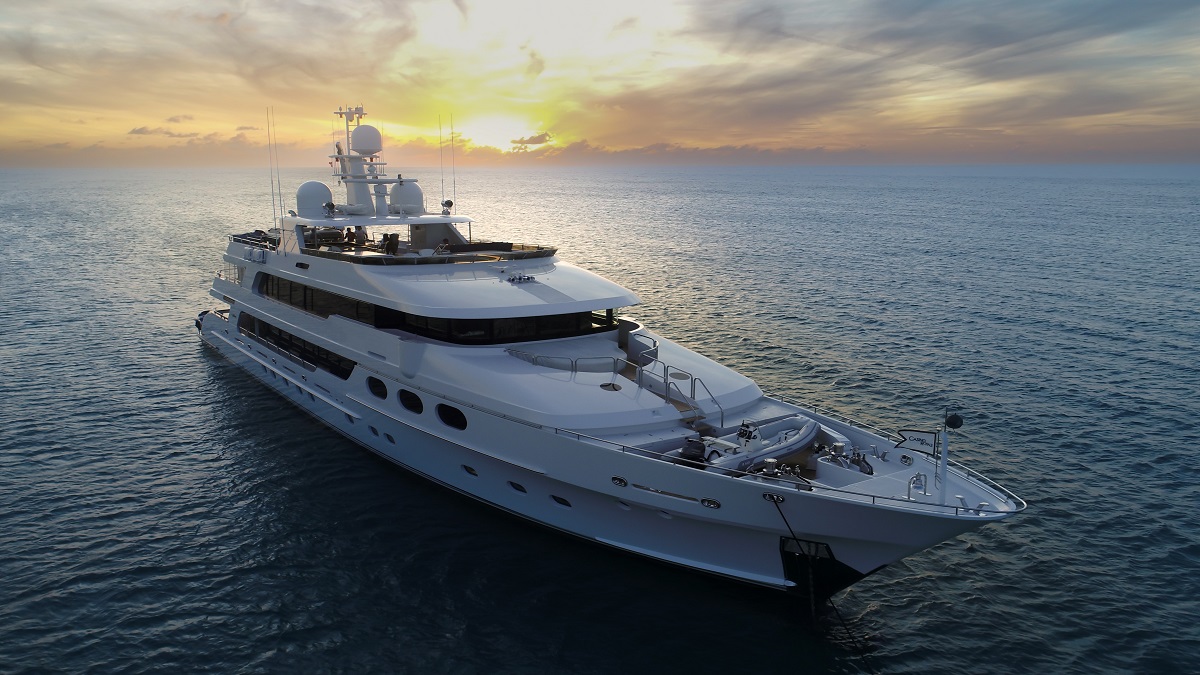
Like any well-run hotel, restaurant, or other luxury service, a crewed yacht needs organized structure and good management. Whether you’re staffing your own luxury vessel or looking for an exciting career working and traveling the world, you need to know how this structure works, and what you can expect to pay or earn and do in the various roles on board.
Every yacht is a little different, and organization may reflect the style of the captain or the demands of the owner. But the same jobs need to be done on almost every boat. Organized with ranks, heads of each division report to the Captain. It’s not a military-style organization, but there are parallels with merchant marine grades and structures.
Smaller yachts need fewer crew, and staff may wear multiple hats that cross more traditional divisions and may combine some jobs with others. Large yachts have more distinct divisions or subdivisions, with more specialization to divide tasks and manage staffing. The core skills are the same, but finding staff with the right blends to do the jobs is key. Crew with broader skills are highly sought after.
As a yacht owner, you shouldn’t have to worry about day-to-day management decisions or organizing all this. That’s why you have a captain, and it’s better to leave staffing decisions entirely up to him or her. But it’s still important to know what it is people you’re hiring do, why they’re there, and how many you need. You don’t want too many crew, or to be short-handed. An understanding of what your yacht needs helps you talk to the captain to keep your yacht running how you want it.
For those looking to break into yacht crew work, consider your skills and strengths, and what jobs appeal to you. You’ll need training before you work, and you can direct your job path through the training you seek. Your goal is a suitable position on a well-run yacht, so make yourself the most attractive candidate possible.
Yacht Work Life
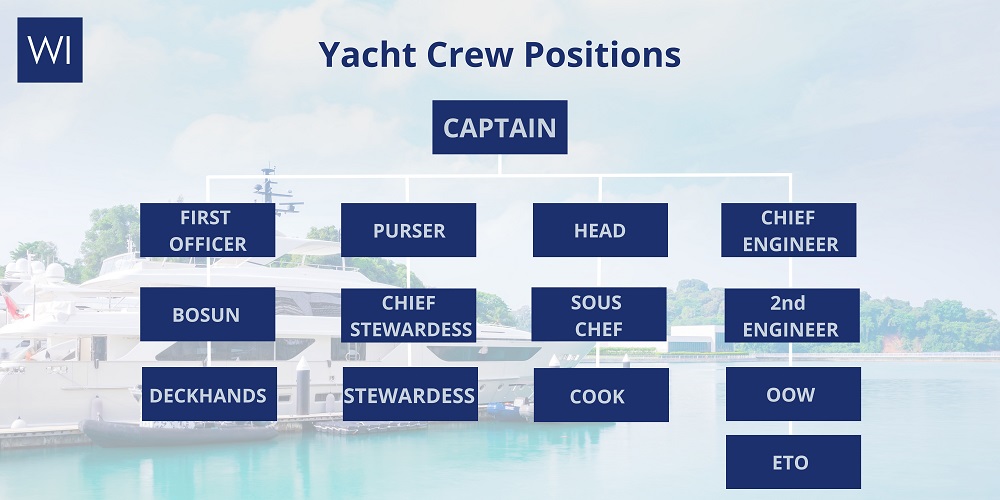
Working on a yacht is also living on the yacht. Crew must have a space to sleep, food, and all the basics that any employee needs. Large yachts have space reserved for crew, and owners looking for quality crew should provide good working and living conditions. Your crew takes care of you, and you should take care of them.
Depending on where a yacht operates or what flag she flies, a variety of labor laws or rules may be in effect. These requirements may be for work visas, contracts and written agreements, and compliance with merchant and ship crew treaties and laws. Be prepared to have work and non-disclosure agreements between yacht and crew, though a few yachts skip this.
Seasonal Jobs
Many yacht positions are seasonal. Year-round employment is more likely for senior crew like the captain and department heads, but not all yachts see year-round use. And some yachts may use different crew in different locales between seasonal moves.
Any job listing should give seasonal information, with geographic information, the length of the season, and the prospects for year-round positions and repeat employment.
Hours, Salaries, and Expectations
Yacht crew is a service job at its core, and every yacht owner is looking for service-oriented people who understand how to deliver a hotel-quality living and restaurant-quality fine dining. Work experience in luxury hotels and restaurants is a big plus for some jobs, and makes breaking into yacht work easier.
Yacht work can be very demanding, with periods of intense work when the owner and guests or a charter party is on board. Long days aren’t uncommon, but often balance with slack time when the boat is empty of passengers. There is always work to be done, but there’s usually a chance for time off.
Most salaries are monthly, since many positions are seasonal. Pay ranges are commensurate with experience, rank, and responsibility. Private vessels usually offer higher base pay, as charter crew can earn tips on top of their base salary. Because of the demands of the lifestyle, compensation is good and you have minimal living expenses on board.
Benefits and Time Off
Because so many jobs are seasonal and may occur in different countries and locations, benefits offered to yacht crew vary widely. But it is not uncommon for crew to be offered health and accident insurance and a flight to the vessel. Living on board, you’ll get food, rooming (usually shared), basic toiletries, uniforms, and laundry. Yachts with a longer view may offer additional training to long-term prospects.
Time off is usually linked to boat use, and may be sporadic in-season or when the boat has the owner and guests on board. There will always be some time off, but it may be between very intense work periods.
Most crew jobs have an employment contract that meets the Maritime Labour Convention 2006 (MLC). This should spell out the contract period and duration, as well as salary, leave and time off, probationary periods, repatriation policies, and any other crucial details to meet the minimum international standards of crew welfare.
This contract should also contain shipboard policies on confidentiality and non-disclosures, drug and alcohol use on board, personal hygiene expectations, interpersonal relationships, and dispute resolution. Job expectations and requirements can also be included, with specific language about roles, tasks, and cooperation between divisions.
Note that all crew agreements will explicitly prohibit drug use on board, most limit alcohol consumption and ban hard liquor on board, and many boats have policies prohibiting intimate personal crew relationships. Because the crew is living on board full time and in close quarters, rules to maintain decorum and crew harmony may be in writing.
Training & Certificates
Two key certifications are required for yacht crew. Employers look for the STCW (Standards of Training, Certification and Watch-keeping for Seafarers) and the ENG1 (Seafarer Medical Certificate). Insurers generally require crew to have these two certifications or the equivalent.
The ENG1 isn’t a class. It’s a medical exam to ensure that the crew is physically fit to serve at sea and has no underlying conditions that may arise far from help. It’s best for prospective crew to secure the ENG1 before investing more time and money training.
STCW is a week-long class on the basics of onboard safety. This includes hands-on modules covering personal survival, fire safety, first aid and CPR, accident prevention, and security awareness. It needs to be refreshed every five years.
Shared, Hybrid, and Crossover Jobs
Larger vessels will have more defined duties and specific areas of responsibility. But smaller yachts may want the crew to have different roles in different situations. For example, a hybrid job description may read “3rd Engineer/Steward” and describe a role in engineering when the boat is empty but on inside crew when passengers are on board.
When hiring or seeking jobs be prepared to look for creative crossover skill sets to meet the needs of the vessel.
Extra Skills and Duties
Any extra skills outside the regular duties makes crew more attractive. From stewards who can teach yoga, give massages or play cocktail piano to deck crew who know how to water ski, SCUBA dive, or fish, anything that crew can bring to enhance the passenger experience adds value to the employee.
If you’re looking for a position, list the skills you’d be comfortable using. If a vessel owner is looking for something specific, spell it out and figure out how that special duty fits into the employee work day.
The Four Main Divisions

Most yacht crews break into four primary divisions which group related tasks and responsibilities together. While the grouping sounds like it’s by section of the boat, they’re really more functional. For example, stewards (Interior) will definitely serve meals, whether they’re in the main dining room or out on deck. Deckhands (deck) are going to be involved in painting, sanding, and varnish jobs anywhere on the boat.
The deck crew handles most of the exterior operations of the yacht, and runs it. Deck hands and crew keep the boat looking clean and shiny, and handling most vessel operations. This includes driving and operating the yacht, navigation, running all launches and ship’s craft, handling lines, and all maintenance and painting, washing, and shining.
2-Interior (or Inside)
Inside crew are primarily the stewards and housekeepers. Larger vessels will have a dedicated housekeeping staff separate from the stewards, but smaller vessels may not.
Stewards keep the interior clean, do all housekeeping, laundry, food and beverage service, cabin preparation, and anything else needed for the comfort of the passengers.
3-Engineering
Below decks, the engineering department ensures the safe and smooth running of all the ship’s machinery and electronics. Engineers are engine and systems specialists, and there will usually be a dedicated electronics expert. Most engineer jobs require professional training and certification.
Fine dining is a hallmark of the yachting experience, and a full-time galley crew prepares all meals for passengers and crew. The head chef plans the menus and provisions the boat, while junior chefs assist the head chef with meal preparation and keeping the galley spotless.
Yacht Job and Department Details
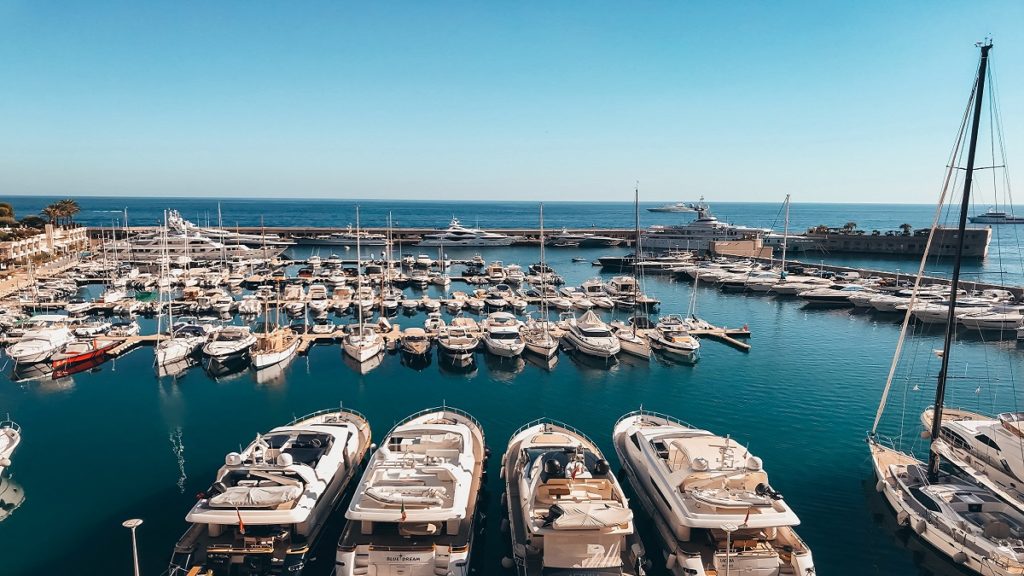
Departments are all organized in a hierarchy, with a department head reporting to the Captain. The clear chain of command makes for smooth operations, with all communications going up and down ranks. Junior staff will occasionally take instructions from other divisions as all crew is expected to help as needed. A captain or department head may organize staff differently, so reporting structures listed are guidelines only.
All salary ranges are monthly figures and are ranges based on yacht size and crew experience. Senior jobs on larger yachts have more responsibility than the same job title on yachts with smaller crews. Experienced crew are very desirable and can expect more pay for their positions.
Listed responsibilities are not exhaustive, and different yachts may allocate some jobs to different positions.
Read also: The yacht charter experience ladder
The Captain

The captain of the vessel is the overall decision maker for the yacht in all situations, including the safety of the vessel. The owner should leave the Captain responsible for operational decisions about hiring and staff and operating the ship. To become a captain requires years of experience and training, and a broad set of skills including yacht operations, personnel management, budgeting and finance. The captain works directly with the owner and owner’s representative, if the captain is not also acting as the representative.
On an organization chart, the Captain is usually placed in the deck division, but the Captain is always the senior-most crew on the yacht and all division heads report to the Captain.
Responsibilities include:
- Responsible for all navigation and running the yacht.
- Senior decision maker on all crew hiring.
- Manage repairs, refits, and yard work.
- Manage budgets and accounting. On larger yachts, this task ends more on the Purser, but the captain is always responsible.
- Ensure all paperwork, clearances, and legal requirements are completed.
- Primary contact with the owner or charter parties.
Reports to: The yacht owner
Salary Range: $6,000 to $22,000
The deckhands handle all the outside responsibilities of the ship, including cleaning and maintenance of the yacht and all the ship’s vessels and toys on board. Deck crew will have significant contact with passengers in this role, operating launches and delivering guests to and from shore and handling the toys.
All deck crew have watch responsibilities on passage, and daily responsibilities keeping the yacht pristine and clean. They will also do line handling and secure the yacht.
Deck department : Chief Mate/First Officer
The Chief Mate or First Officer is the second in command of the vessel, and left in charge when the Captain is not on board. The first mate has the requisite skills to stand in for the captain and run the yacht if needed and usually acts as the division head of the deck team.
The seamanship skills needed are similar to the Captain’s position.
- Primary safety officer for the yacht and all passengers and crew.
- Supervise and manage all operations on deck.
- Bridge watches on passage.
- Passage planning and navigation.
There may be additional mates on larger vessels, these 2nd, 3rd, etc. mates have similar responsibilities on rotation. But the first mate is senior and always second in command.
Reports to: Captain
Salary Range: $4,000 to $9,500 (First mate)
Second and more junior mates may earn $2,000 to $4,000
Deck department : Bosun
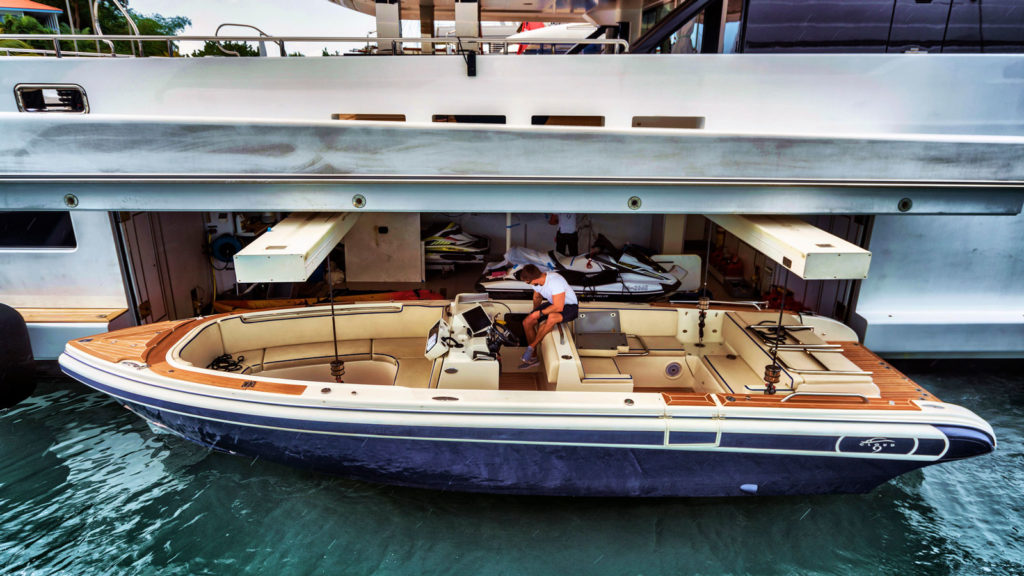
The Bosun is the senior deckhand and manages the junior hands on board. This will usually be the most experienced hand on board.
- Organizing all operations on deck.
- Coordinating the use, storing and launching of the ship’s boats, toys, and equipment.
- Managing the passerelle, watching passenger safety.
- Contact point for guest service on boats, toys, and trips to shore.
Reports to: First mate
Salary Range: $3,000 to $5,000
Deck department : Deckhands

Deckhands are constantly busy with maintenance, cleaning, polishing, and assisting guests as needed. They will assist other departments as needed or given special duties.
- Daily cleaning of the yacht’s exterior.
- Painting, varnishing, polishing.
- Line handling.
- Launching and operating dinghies and tenders.
- Repairs and carpentry.
- Helping guests as needed – everything from handling baggage and gear to embarking and disembarking.
Reports to: Bosun
Salary range: $1,300 to $3,000
Though every position on a yacht is service-oriented, the interior or inside crew provides the primary customer service. They will interact the most with the passengers daily, and they’re directly responsible for the quality of their experience on board.
Interior department : the Purser

The purser is the chief financial officer of the yacht and handles all the financial operations on board. Accounting, purchasing, payroll and hiring, and all money matters end up with the Purser. This is a senior staff position, and may be the interior department head. Smaller yachts may eliminate the purser’s job and add it to the captain’s and other senior staff duties.
Responsibilities Include:
- Accounting and bookkeeping for all financial transactions.
- Human resources and payroll.
- Handling logistics for all departments related to purchasing.
- Managing contracts.
- Event coordination, including off yacht bookings and payments.
- Primary administration of the boat’s business paperwork.
- Inventory and supply management.
Salary Range: $4,000 to $8,000
Interior department : The Chief Steward/ess

The chief steward or stewardess has primary responsibility for all service roles inside. Food and drink service, cabin preparation, and anything to do with helping the passengers be more comfortable and enjoy their stay. The chief steward will be inside crew with several years of experience.
The chief steward manages the interior staff, setting and enforcing vessel service standards. The chief steward ensures the crew delivers a five-star hospitality experience.
Chief Steward Responsibilities:
- Scheduling and training junior crew for meal and drink service and cabin preparation.
- Primary contact with guests for meals and drinks.
- Sommelier and wine service.
- Coordinate with the galley for meals and presentation.
- Decorate the interior, from flower arrangement to table settings.
- Arrange onshore activities and outings.
Reports to: Captain or Purser, depending on the yacht
Salary Range: $4,000 to $8,500
Stewards/Stewardesses
The stewards and stewardesses are the primary guest service staff. They will work closely with guests and passengers, and have daily contact with them as they meet most of their needs while on board.
Steward Responsibilities:
- Food and drink service.
- Room preparation and turndown service.
- Cleaning, polishing, housekeeping, and inside maintenance.
- Cabin detailing.
- Laundry, pressing, and folding.
- Help with outings, trips, debarkations.
Reports to: Chief Steward
Salary Range: $1,500 to $4,500
Housekeeping

Larger yachts may have a dedicated housekeeping and laundry staff. This will be part of the inside crew, under either the purser or the head steward. There may be a senior housekeeper, if there are more than one housekeeping crew on board.
Responsibilities are the cleaning and laundry portions of the steward’s job, and a laundry steward may spend most of her time inside the ship’s laundry.
An experienced Head of Housekeeping may earn from $4,500 to $7,000, while a Laundry Steward typically earns from $2,500 to $3,500.
Read also: CAN OWNING A YACHT TO CHARTER (REALLY) BE PROFITABLE?
Food service requirements on any yacht are high. Whether it’s a privately owned vessel or a charter, the expectations are always for top tier food service, with a variety of meals planned for the requirements of every passenger. Chefs and cooks prepare all meals on board for passengers and crew, but sometimes other interior crew may help with prep work or cleanup.
Smaller yachts have smaller galley crews, but the largest vessels may have an executive chef and several sous chefs. All chef positions require formal culinary training and experience, but cook positions are often entry level. Promotion from cook to chef is unusual without additional training.
Galley department : the Head / Executive Chef

On larger yachts, an Executive Chef will run the entire galley with the help of sous chefs and cooks. With an Executive Chef, there’s an expectation that the food and menus will be on a level with Michelin star-rated restaurants.
The executive chef brings a thorough understanding of food preparation and presentation, and moves food preparation past creative up to artistic. Job responsibilities are similar to a chef, but the job demands and the required experience and education are much higher.
Salary range: $7,000 to $11,000
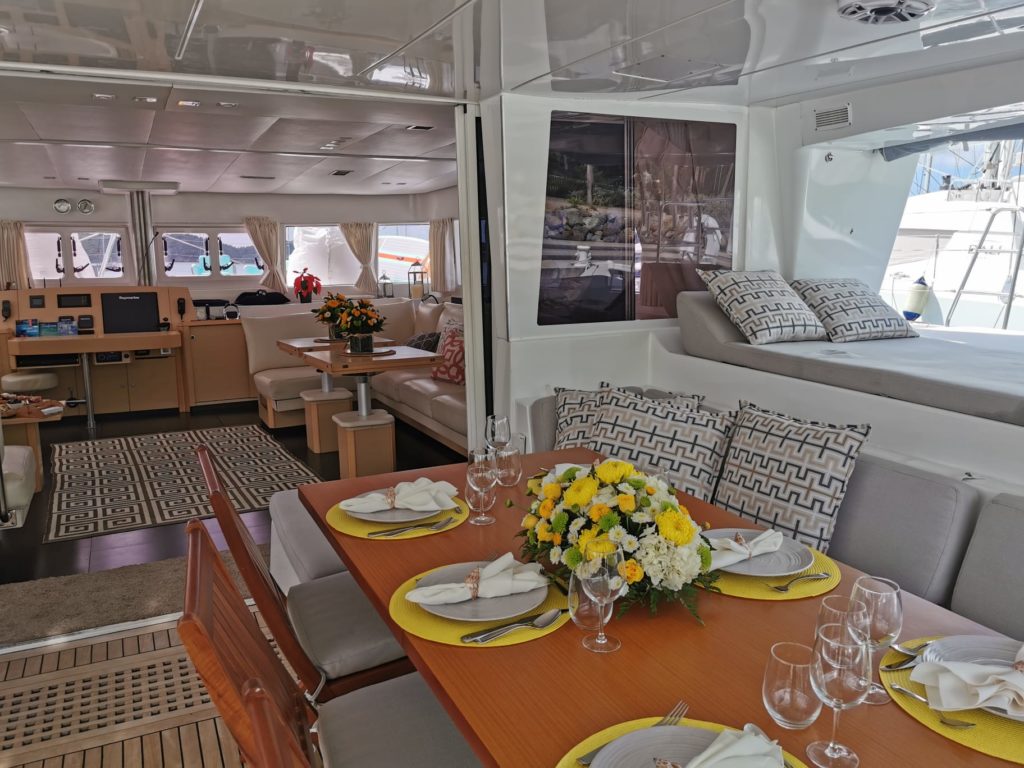
The chef has overall responsibility for all meals on the yacht, from provisioning in remote places to hygiene and good safety. If there’s only one chef, she’s the head of the galley crew. Finding the best provisions in far away locations and making the best of local food availability is a major part of the job.
- Planning a delicious and varied menu for passengers.
- Sourcing all food and arranging transport to the yacht.
- Maintaining and operating within the galley budget.
- Preparing passenger meals with professional presentation and style.
- Cleaning and maintaining galley and galley equipment.
- Deliver menus and meals on time, while running an organized and spotless galley.
Galley department : Sous Chef
The sous chefs assist the chef in all aspects of running the galley, and may have independent assignments to plan and guest and crew meals. While not primarily responsible for provisioning, the sous chef will help with food selection, menu preparation, and planning. A sous chef must have formal culinary training.
Reports to: Head chef
Salary Range: $3,500 – $6,000.

Galley department : The Cook
Cooks may be entry-level positions or experienced, but do not require formal gastronomy education. They will assist the chef and sous chefs, cooking meals and dishes for guests and crew, helping with provisioning, and keeping the galley neat.
- Assist with provisioning and buying high-quality food from local sources.
- Follow all food handling and safety guidelines.
- Assist the head chef as needed, taking direction and guidance.
- Prepare guest and crew meals as required.
- Staying on top of galley inventories and supplies.
Salary Range: $2,500 to $3,500
Engineering

The engineering department keeps the yacht and all its systems working. Whether it’s the engines, electronics, air conditioning, or the plumbing – it’s up to engineering to keep it running.
There is considerable overlap with commercial shipping in the engineering field, as many of the same skills apply. And there is a broader range of qualifications and grades based on the size and power of the vessel. Job ratings may be set by required experience based on tonnage of ship or power of engines, with corresponding levels of pay and responsibility.
Unlike commercial shipping, engineers may get involved in other aspects of running the yacht, like helping with docking and water sports with mechanical toys.
Engineering certifications, training, ratings, experience and licensing are critical to hiring competent engineers, and for engineering crew it’s an important facet of career advancement. This is important for Chief and 2nd Engineers, which are often broken out by MCA (U.K. Maritime and Coastguard Agency) rating or other international equivalent.
MCA ratings for engineers Commercial and Private Yachts over 24m are:
Y4: Less than 200 Gross Tons and less than 1,500 kW engine power Y3: Less than 500 GT and 3,000 kW Y2: Less than 3,000 GT and 3,000 kW Y1: Less than 3,000 GT and 9,000 kW
There is also an unlimited rating for merchant vessels larger than the Y1 category. For discussing salary and responsibilities, we will include all ratings in one position description, but pay scales with the size of the yacht and any required higher ratings.
Chief Engineer
The chief engineer manages all aspects of keeping the yacht and its systems running. The chief engineer manages all the engineering staff, and directs all maintenance, repairs, troubleshooting and upgrades. This is a management position, but requires extensive hands-on technical experience and knowledge. Chief engineers on large yachts hold an MCA Y1 or Y2, smaller boats will have a lower rated chief and a smaller staff. Check Jooble.org to find abroad marine engineer vacancies.
- Provisioning, shopping, and stocking.
- Preparing passenger and crew meals.
- Following instructions and cooking under the direction of others.
- Galley cleaning.
- Follow food safety and storage procedures.
- Food pre-preparation.
Salary Range: $6,000 to $15,000
2nd Engineer
The second engineer is also a highly skilled position requiring a rating or license and several years of experience. This senior level engineer also needs knowledge of how to troubleshoot and maintain all yacht systems.
- Maintain and manage all engineering operations.
- Hire, train and supervise all engineers.
- Project manage all upgrades and retrofits, including managing budgets, contracts, and suppliers.
- Coordinate maintenance schedule for the entire yacht around the usage and seasonal schedules.
- Maintain costs and accounting for engineering operations.
- Design and handle all safety operations.
- Set and maintain standards for operations and cleanliness in the engine room.
Reports to: Chief engineer
Salary Range: $5,500 – $10,000
OOW (Officer of the Watch) Engineer
The OOW is a junior engineering position, but still licensed. There are two categories of OOW – MEOL (Marine Engine Operator License) and the more junior AEC (Assistant Engine Course). The overall responsibilities are similar, working to support the senior engineers and handle independent assignments. The AEC rating is entry level for licensed crew, but has training and certification.
- Support the chief in all projects.
- Maintain a clean, safe engine room.
- Perform all maintenance, troubleshooting and repair tasks as needed.
- Support motorized water sports.
- Occasionally assist with other vessel operations, like line handling.
Reports to: Chief Engineer
Salary Range, MEOL: $4,500 to $6,000 Salary Range, AEC: $2,500 to $3,500
Electronics/Technology Officer (ETO)
The ETO takes responsibility for all audio-visual and information technology on board. Ensuring passengers have access to the internet, movies, television, and music is a primary responsibility. This position carries a fair amount of passenger interaction, and an ETO needs good troubleshooting skills to go with customer service skills.
- Ensure all audio/visual and entertainment systems are always available for passengers.
- Assist passengers with personal technology and ship systems as needed.
- Conduct regular maintenance and upgrades of the network, information, and A/V systems around passenger schedules.
- Assist other engineers as needed, especially with electronic systems.
- Contribute as needed with other departments for boat and passenger operations.
Salary Range: $4,000 to $9,000
Junior Engineer
This is a lower or entry level position for someone with engineering skills but without formal licensing or certification. The junior engineer will help with safety and cleanliness, and assist in any engineering tasks as needed. The ability to solve problems and fix things opens this spot for anyone capable and willing to do the job.
- Help with cleaning, maintenance, and safety functions.
- Help anywhere needed on the yacht.
- Assist senior engineers as needed, taking direction and following instructions exactly.
- Constantly develop skills.
Read also: IS BUYING A BOAT A BAD IDEA?
Whether you are a yacht owner or considering entering this dynamic industry with an established and reliable crew, it is essential to have an understanding of the yacht’s hierarchical structure, mission priorities, and salary expectations. By doing your research on the complexity of yachting before hiring your team, you can confidently select the right group of experienced and qualified professionals for your needs. Staying up-to-date on top industry trends and knowing the capabilities of each type of yacht crew position will enable you to make sound decisions that support a safe and cost-effective journey. With quality personnel at your helm, you can cruise unhindered in luxury and explore new destinations with peace of mind.
Yachts in Below Deck: All Boats of the TV Show (& their Prices!)
What is the best country to register your yacht offshore, you might also like.

What differentiates a yacht from a superyacht or a mega yacht?
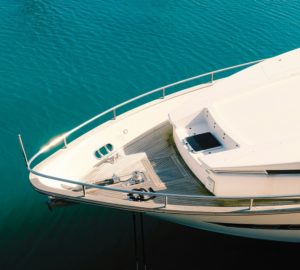
Chartering Requirements and Regulations: A Guide for Boat Owners

What are the Fastest Cruising Catamaran on the Market?
9 superyacht crew members share what it's really like working for a billionaire on board
- Superyachts are luxurious, but working on them isn't.
- Insider polled superyacht crew members to find out what it's really like working for a billionaire on board.
- They said their days are spent fulfilling requests and keeping the yacht in top shape — but it really all depends on the superyacht owner.
- Visit Insider's homepage for more stories .

While working on a superyacht sounds glamorous, in reality it can be anything but.
Insider polled superyacht crew members to get an inside look at life on board. When asked what working for a millionaire or billionaire is really like, they agreed on a few things, like long hours.
Many superyacht crew members wake up before dawn to start their day, which typically involves a lot of cleaning and catering to the requests of owners and guests.
Read more: The super rich are hoarding cash — instead bartering yachts, $30 million mansions, and caviar to ride out the pandemic
But while some superyacht owners are demanding, others are less so — it really all depends on their personality. Some crew members said that owners and guests are more like regular people than you'd expect.
Here's what life on board looks like, according to nine superyacht crew members.
Note: Insider was able to verify each crew member's identity, but we refrained from publishing their full names to protect their privacy.
Working on a yacht can be lucrative.
Insider previously reported that deckhands earn an average of $3,083 to $3,574 a month, depending on the boat size. Captains reportedly get paid even more — they earn $7,750 to $19,961 a month on average.
Kate Lardy of the Sun Sentinel reported that a captain in Fort Lauderdale once spent a total of $14,255 on day workers, who are hired temporarily for onboard services, during a two-month period.
But it's also tiring and demanding.
One captain who works on a 120-foot boat alluded to tiring conditions. Working for a billionaire is "demanding," he said, with hours that begin very early — before 6 a.m. — and end very late.
Yacht crew members have to meet high expectations.
One electronic technical officer who works on a 223-foot yacht stressed the pressure of delivering top-notch service while remaining level-headed.
Working on a yacht involves "very, very long days with little rest and expectations to perform at the highest levels of service while not losing your cool under pressure," he said.
They have to work hard to keep yachts spotless.
Guests and owners can be messy and dirty — and it's up to the crew to make sure it doesn't look that way. A mate on a 92-foot yacht said he had to wake up before guests or other crew members to get the yacht's exterior ready for the day.
"They expect it to look like no one has touched it," he said. "So any rain or dew, water spots, bird crap, or salt spray has to be continuously cleaned, not to mention having to constantly wipe stainless [steel] and glass when guests move around the boat. They leave smudges and fingerprints everywhere.
"By the time I start at the top of the boat and move around drying the boat, washing windows, and prepping water toys, depending on where the guests are, it's time to clean behind them."
He said he then has to be available for whatever the day brings, whether guests want to take the tender out or play with water toys, the interior crew needs help with service, or any maintenance issues need to be addressed.
There's a lot of cleaning, smiling, and snacking.
Nic, a chief stewardess, shared her typical daily itinerary, which extends from 6 a.m. to 11 p.m., with a one-hour break for a power nap.
There's constant snacking, as she doesn't always have time to sit and eat, she said. She's also "always thinking and planning ahead for the next meal or excursion," like what guests "need to take with them and what they need upon return," she said.
"Always thinking of ways to make the day special and 'perfect' (as much as possible)," she said.
She added: "Cleaning, cleaning, cleaning, and lots of smiling. Behind the scenes, a lot of running around and working at high speed, throwing stuff into drawers and sorting it out later when you have time, laughing, and keeping crew spirits high. Never-ending laundry."
Work is easier when the owners are away, which is often.
Billionaire owners actually don't spend a lot of time on their multimillion-dollar yachts. Neither do the guests who charter them.
"Owners or guests are typically not on the boat all that much, so most of the time the crew has the boat to themselves," said Michael, a former yacht captain who worked on yachts ranging from 130 to 170 feet.
"Work is pretty easy and consists of general maintenance and keeping the boat in perfect/ready state for when the owner does show up. If you have a good crew it can be very enjoyable. If you do not, it can be very stressful and miserable."
Everything depends on the owner's personality.
Some crew members get lucky working for generous yacht owners, while others get treated like the help.
"It's hard work and long days when they are on board," said Martin, the captain of a 155-foot yacht. "It really depends on the owner. Some have treated me like family, and some have treated me like a servant."
But sometimes it's not the owner who's difficult.
A chef on a 150-foot motor yacht also said that working for a billionaire could be unpredictable, as every boat and owner is different.
But it's not the owner of the yacht who's always difficult to work for.
"Bear in mind that the captain is every bit as much your boss as the owner is, and sometimes the captain is a bigger pain in the ass than the billionaire owner," she said.
Yacht owners are just your everyday people on vacation — with more money.
According to Mark, the captain of a 114-foot yacht, billionaire owners are just like normal vacationers. Kind of.
"They're just people holidaying, but with more money and toys to fill their days," he said.
They can be more down-to-earth than expected, but their spontaneity can be frustrating.
"It's really nice to find out that some of the wealthiest people you'll work for are actually more down-to-earth and normal like any person you'd meet on the street," a stewardess on a 112-foot sailing yacht said. "The saying is 'money screams, wealth whispers.'"
She added: "A typical day involves turning heads, beds, and laundry for guests and crew, which can be a lot if you're a department of one. Food and beverage service three times a day. A lot of plans and schedules change on the fly depending on the owners and their wants and whims, which can be a bit frustrating."
- Main content
The Ultimate Guide to Yacht Crew Salaries
- by yachtman
- September 16, 2023 August 26, 2023

Yacht crew salaries – a topic of intrigue for many. If you’re asking yourself how much these professionals make, this guide is for you. Here, you’ll find all you need to know about yacht crew salaries.
Factors like the size and type of the yacht, its location and cruising itinerary, all influence pay rates. Moreover, experience and qualifications of the crew matter too when it comes to salaries.
In addition to the usual suspects, there are other unique details to yacht crew salaries. For example, some yachts reward their crew for excellent service or guest feedback. So hard work can bring you more than just a base salary.
Let me share a true story. Sarah is a highly experienced chef aboard a luxury superyacht in the Mediterranean. With her culinary skills and extensive training, Sarah earns a salary that reflects her expertise and talent.
Yacht crew salaries are a complex mix of vessel type, location, qualifications, and performance-based rewards. By exploring this guide, you’ll gain valuable insights into this fascinating aspect of the yachting industry. Let’s get started!
Understanding the yacht crew salary structure
Salary structure for yacht crew is key to understand when wanting a career in the yachting industry. See the following breakdown of positions and their corresponding average monthly salaries:
Aside from these positions, experience, qualifications and yacht size can affect salaries. Gratuities can boost earnings too.
It’s important to be aware of trends when it comes to salary structure. Demand for experienced crew has been growing due to luxury yacht vacations. Salaries have also been rising.
It’s essential to know the yacht crew salary structure if you want to pursue a career in the yachting industry. Knowing average salaries and keeping up with trends will help you make smart career decisions.
Factors that influence yacht crew salaries
Various factors impact yacht crew salaries, like experience, job position, and yacht size/type . Experience enhances earning potential, while captains/engineers earn more than deckhands/stewards. Larger yachts often offer higher wages, and yacht type impacts specialized skills compensation. Certifications, language proficiency, and additional skills also factor in. According to SuperYachtTimes, certain destinations offer more competitive remuneration packages due to market demands and living costs variations. When considering a career in this field, take these factors into account to shape your earning potential.
How to negotiate yacht crew salaries
Here’s a guide to help you negotiate yacht crew salaries and get the best pay package:
- Do Research : Learn the industry standards for yacht crew salaries. Look into job roles, experience levels, and vessel types to set a benchmark.
- Assess Yourself: See how your skills, qualifications, and experience compare to other crew. Show any special strengths or certifications that could get you a higher salary.
- Get Ready to Negotiate: Prepare evidence for your desired salary range. Be ready to show your successes, awards, and extra value.
- Pick the Right Time: Time is key when negotiating salaries. Look for moments when your employer is okay with it, like during reviews or contract renewals.
- Show Your Case: During talks, explain why your salary should be higher, but stay professional and respectful. Highlight how you’ve helped the team or operations.
- Look at Non-Financial Benefits: If a raise isn’t possible now, try longer vacations, better housing, or professional development to boost your package.
Remember, negotiation is an art and needs both parties’ needs and expectations. By following these steps and customizing them to you, you’ll ace salary talks with confidence.
Pro Tip: Stay open to compromise, but aim higher than your target salary range to have some room to move without undervaluing yourself.
Expected salary ranges for different yacht crew positions
Salaries for yacht crew members vary greatly , depending on their position and experience. Here’s a look at the expected salary range for different roles in the yacht industry:
Note: These figures are estimates, and can change due to yacht size/type, location, and individual skills/certs.
To increase earning potential, get specialized training/certs related to your role. Qualifications make you more appealing to employers. Network within the industry. Go to events and join pro orgs – meeting people who can give valuable connections. Building relationships with captains/brokers can get you better jobs with higher salaries.
Maintain professionalism and dedication at work. Yacht owners value crew members who show reliability and hard work. Going above and beyond can help you stand out when it’s time for promotions/salary negotiations.
By following these tips and investing in your skills/network, you can make the most of the yacht industry.
Tips for career advancement and higher salaries in the yacht industry
Seek out chances to advance your career, such as going to industry conferences or getting certifications. Make connections with important members of the yacht industry, both on and offline. Doing this can give you access to job openings and mentors. Show off your skills through a resume and cover letter when applying for jobs. Showcase experiences and accomplishments that will make you attractive to employers. Be open to taking on different jobs or tasks to get varied experience and make yourself more marketable.
In addition, stay informed about current industry trends. Find out about new tech, regulations, and best practices. This way, you’ll be seen as an invaluable asset to the yacht industry.
As an example, Sarah started as an entry-level stewardess but quickly rose through the ranks. She was recognized by her co-workers and bosses. In a few years, Sarah became chief stewardess on a top yacht. She was successful due to her excellent skills and adaptability. Now, Sarah earns higher salaries and has more opportunities for career advancement.
By following these tips, as well as being determined and hardworking, you can enhance your career prospects in the yacht industry and make more money.
Analysis of yacht crew salaries shows insights, both for inexperienced and experienced crew members. High demand for yachting professionals has created competitive compensation packages, plus yearly increments and benefits like accommodation, travel allowance, and food. Salary structures vary based on factors like experience level, yacht size/type, job role, and location.
It is vital to look at certifications and specialized skills for understanding crew members’ earning potential. Get additional qualifications like STCW certificates or culinary training to increase the chances of getting higher-paying jobs. Positions like diving instructors or onboard beauty therapists come with attractive remuneration packages.
To not miss out on great opportunities, stay up to date with industry trends. Network with fellow professionals through conferences or online platforms. By staying connected and informed, you can maximize your earning potential .
Frequently Asked Questions
FAQ 1: What factors determine yacht crew salaries?
Answer: Yacht crew salaries are determined by various factors such as experience, position, size and type of yacht, level of qualification, location, and the owner’s budget.
FAQ 2: What are the typical positions and salary ranges in the yacht industry?
Answer: Typical positions in the yacht industry include captain, first mate, chef, stewardess, and deckhand. Salaries can vary significantly, with captains earning $80,000 to over $200,000 per year, while deckhands may earn $30,000 to $50,000 per year, depending on experience and other factors.
FAQ 3: Are there any additional factors that can affect yacht crew salaries?
Answer: Yes, additional factors can include bonuses, tips, benefits, overtime pay, and the length of the working season. These factors can significantly impact the overall salary package for yacht crew members.
FAQ 4: Are there opportunities for career advancement and salary growth in the yacht industry?
Answer: Absolutely! Yacht crew members can advance their careers and increase their salaries by gaining additional qualifications and experience. Progressing to higher positions such as chief stewardess or captain can lead to higher income and better job prospects.
FAQ 5: Do yacht crew members receive any additional benefits besides their salaries?
Answer: Yes, besides their salaries, yacht crew members often receive additional benefits such as free accommodation and meals onboard, health insurance, retirement plans, transportation allowance, and the opportunity to travel to exotic locations.
FAQ 6: How can I find accurate and up-to-date information about yacht crew salaries?
Answer: It is recommended to consult reliable sources such as industry publications, yacht crew agencies, and professional associations specializing in the yacht industry. They can provide accurate and up-to-date information on yacht crew salaries.
Leave a Reply Cancel reply
Your email address will not be published. Required fields are marked *
Save my name, email, and website in this browser for the next time I comment.

The global authority in superyachting
- NEWSLETTERS
- Yachts Home
- The Superyacht Directory
- Yacht Reports
- Brokerage News
- The largest yachts in the world
- The Register
- Yacht Advice
- Yacht Design
- 12m to 24m yachts
- Monaco Yacht Show
- Builder Directory
- Designer Directory
- Interior Design Directory
- Naval Architect Directory
- Yachts for sale home
- Motor yachts
- Sailing yachts
- Explorer yachts
- Classic yachts
- Sale Broker Directory
- Charter Home
- Yachts for Charter
- Charter Destinations
- Charter Broker Directory
- Destinations Home
- Mediterranean
- South Pacific
- Rest of the World
- Boat Life Home
- Owners' Experiences
- Interiors Suppliers
- Owners' Club
- Captains' Club
- BOAT Showcase
- Boat Presents
- Events Home
- World Superyacht Awards
- Superyacht Design Festival
- Design and Innovation Awards
- Young Designer of the Year Award
- Artistry and Craft Awards
- Explorer Yachts Summit
- Ocean Talks
- The Ocean Awards
- BOAT Connect
- Between the bays
- Golf Invitational
- Boat Pro Home
- Pricing Plan
- Superyacht Insight
- Product Features
- Premium Content
- Testimonials
- Global Order Book
- Tenders & Equipment

Team works: The insider's guide to hiring the perfect superyacht crew
Yachts need the right staff, made of the right stuff, to ensure a happy ship. Caroline White discovers the secrets of crew casting...
The wrong superyacht crew will transform your precious days at sea from the grandest holiday money can buy into the world’s most expensive purgatory. You’re trapped. And you’re paying for it. So while it might be more tempting to ponder the marble top for your sundeck bar, it’s also worth learning a little about how to find the right crew – and how to remedy the situation if you end up with the wrong ones. Or you might spend more time than you’d intended at that bar.
To a degree, the traits desirable in potential crew are obvious. Ian Pelham, director of crew agency Preferred Crew, reels off qualities such as attention to detail and teamwork, as well as broader attitudes such as a sense of adventure and “getting joy out of watching people end up happy”. Similarly, Louise Cailbourdin, crewing manager at the Crew Network, Fraser’s crewing arm, lists pride in appearance and good personal hygiene, adding “the light in their eyes that shows enthusiasm”.
When he’s hiring, Tripp Hock, captain of 45 metre Heesen motor yacht Amore Mio , looks for a certain grit in that enthusiasm. “The one thing you can never teach is that ability to be pleasant 24/7. I am often judging candidates during interviews – imagining, after endless weeks of back to back charters, will their smile win the battle over the fatigue or not?”
What’s more surprising is that, leaving aside dishonesty and major psychological problems, Pelham thinks that most character types can be accommodated on one yacht or another – it’s just a matter of finding the right match. “I’ve got a client who had been through a number of different deckhands,” he says. “The problem was that everybody on deck was from a particular region of Australia, where their sense of humour was a little aggressive, even insulting. Folks that came in without that same cultural niche felt very quickly isolated – and with this particular group if you reacted negatively or were embarrassed by the way they picked on you, the picking became harder. So they needed somebody who had a thick skin so that they would fit in.”
This is where crew agencies earn their stripes, really getting to know crew and building up a portfolio, with someone to suit every boat. The logical extension of that is psychometric testing (the best known example of which is the Myers-Briggs test) to establish personality types, strengths and weaknesses and therefore help a captain or owner build a rounded and cohesive team. “I am 100 per cent in favour of them,” says Pelham. “The only reason we don’t use them is that they’re outrageously expensive, but if somebody created psychometric testing ‘lite’ I am convinced that it would do very well in yachting.”
Pelham finds the major issues come when crew aren’t honest with themselves. “Where we bump into the most trouble is if somebody hasn’t really given thought to what they want. If they don’t know what they’re looking for and if they have some charisma, they may be able to sell themselves for a position or a programme, but once they get on board they don’t fit and they end up not staying very long.”
So how do you cut through the charm and get to a truth that a potential employee doesn’t want you to know? Sometimes the flaw in a candidate is so brazenly on show that very little insight is required. “There was one occasion when a crew member swore blind they didn’t smoke, but had a packet of cigarettes in their breast pocket throughout the interview,” Cailbourdin says.
Most of the time, though, this is where interview experience pays dividends. “If you ask somebody the same question in two different ways – one where it seems that you’re trying to bring out one particular answer and another where you’re trying to bring out the opposite – if they haven’t given thought to what they want to do, they’ll try to answer the question the way they think you want to hear the answer,” says Pelham, “and you will end up with diametrically opposed answers from the same person. That’s usually an indication that they’re not solid in what they’re seeking.”
Cailbourdin points to body language: “Lack of eye contact, slouching, folded arms or, if you ask probing questions, their eyes start rolling or they become defensive. Fortunately this contrasts with our usual interview experience.” She also warns that sometimes enthusiasm comes with a drawback. In years gone by, when becoming a crew member didn’t require someone to invest in basic training, newcomers were often only motivated by fun and adventure. “So the smell of alcohol at 9am, for example, or slurred telephone conversations at lunchtime were frequent red flags.”
That doesn’t mean, however, that “green” crew members are always a bad idea. “There are huge benefits in going with crew that are fresh to the industry,” says Pelham. “The number one complaint I get from captains, mates, chief stews about somebody with a year or so under their belt is they go back to ‘well, that’s not the way we did it on our last boat’. Bad habits don’t necessarily mean knowing how to sneak around work or avoid doing things. Fresh crew come in like a sponge, ready to absorb whatever that particular manager has to offer.”
Hock thinks that experimenting with unconventional hires can have huge potential benefits. “For example, at the moment I have a 40-year-old junior deckhand,” he says. “While not the traditional demographic for that role, he brings a freshness, an eagerness to start in the industry at this age – and a maturity – that makes him a really wonderful crew member.”
But whatever their experience, surely the most obvious way to find out about a potential crew member is through their CV and references. “I’d recommend that even if you have a written reference, you or your agent call and do a verbal reference check,” says Pelham. “There are things that nobody puts in writing. Nobody says, ‘would you please put down that I adhered to the boat’s drug and alcohol policy’. But that’s a question that needs to be asked.” Also, sometimes people just lack integrity. “Checking licences is important. There have been cases where licences have been fake,” says Cailbourdin.
As important as selecting the crew of your dreams, though, is ascertaining your respective rights and responsibilities – particularly if one or two turn out to be less dreamy than you’d expected. “We’re split into two camps,” says John Leonida , a partner at UK law firm Clyde & Co. “If it’s a commercial boat it’s governed by the Maritime Labour Convention. Crew will have an appropriate employment contract and disciplinary procedures, in the way that a big corporation or any serious company has onshore.”
If it’s a private boat, not governed by the MLC, things can get more complex. Leonida gives an example: “You are a crew employment company or an owner and you decide that a crew member’s contract is governed by BVI law but the yacht is permanently berthed in France and the crew member has some connection with France – they have an apartment there, they pay taxes there. It may then be that French law applies. We’ve seen it on several occasions over the years, that the crew member is dismissed and suddenly we find ourselves within the French legal system. Then you’ve got to take the decision – do you challenge jurisdiction or do you just go with it?”
In general terms, avoiding such complications often boils down to being a reasonable employer – yet there are some obvious no-nos that still come up time and again in superyachting. “You hear the stories that a stewardess will be hired, but then madam might find that she is too pretty and wants to get rid of her,” says Danny McGowan, strategic organiser focusing on superyachts at maritime trade union Nautilus International. He suggests the wisest way to proceed is to adhere to the Merchant Navy Code of Conduct, which has been ratified both by Nautilus and the MCA and which he describes as “one of the fairest disciplinary processes that we could see somebody taken through”.
What you don’t do, says Leonida, “is just fire on a whim, unless there is gross misconduct or the safety of the vessel is at risk, at which point you can offload them, but not necessarily fire them. And, of course, you can’t just abandon a crew member on a small atoll in the middle of nowhere. You have an obligation to get them back home.”
McGowan suggests getting in contact with his union before things get nasty in the first place. “For example, companies like Shell and Maersk and huge shipping companies have voluntary agreements with us where we’re able to do [mediation],” he says. “They maintain those agreements with us because they’d rather deal with an organisation of our standing and history when it comes to discipline and dismissals than either individuals or solicitors engaged by someone looking in the phone book.”
And, of course, that will leave you more time to enjoy your sundeck bar , on a voluntary basis.

More stories
Most recent, from our partners, sponsored listings.

Why Crew Welfare Should be at the Heart of Yachting

On the 3rd December last year in London, ISWAN (International Seafarers Welfare and Assistance Network) revealed disappointing findings from their research into crew welfare in the superyacht industry.
With 82% of the 402 crew surveyed citing low morale, 75% working over their contracted hours, 80% of females and 54% of males reporting episodes of stress, is it any wonder that we see high crew turnover in the superyacht industry?
Enquiry into the level of sexual harassment in the superyacht industry has also raised concerns. During the Monaco Yacht Show last year, the PYA (Professional Yachting Association) presented their findings from a survey on sexual harassment, revealing 65% of respondents ‘having witnessed or been aware of an incident of sexual harassment, physical or verbal, involving other people on board’.
This is echoed by a crew turnover survey conducted by Impact Crew in 2016 which found that over 60% of crew had experienced poor leadership on board.
If these results are not a surprise to you, they should be. If a shoreside organisation revealed similar findings, they would be under investigation by a raft of governing bodies. Despite significant growth and progress towards professionalising the superyacht industry, it’s still decades behind, but the question is why? What lies at the root and how do we change it?
Many talk of the need for a culture shift, but what does that mean?
Perhaps the industry attracts certain types, or perhaps crew become immune to some of the behaviours and expectations they face. It’s not uncommon. Speaking recently to a young female deckhand she recounted an evening when she accompanied her captain to find a hooker for a charter guest, inviting women back to the yacht to strip and have their photos taken and sent for approval, with the rejects being escorted back to the street. The story was regaled with the same sense of normality as a trip to the store.
Perhaps crew are fearful of losing the job. It’s often difficult to say ‘no’, and if you object or make too much fuss, there is always someone else who willingly steps into your shoes, whether it’s a junior deck hand, the captain or a management company.
On the other hand, are today’s crew just less resilient than their predecessors, claiming to be overworked, harassed or bullied, when really it’s just a bit of banter?
Is either account acceptable in the modern workplace?
Culture Change and Leadership
Karine Rayson, The Crew Coach , who provides counselling, coaching and on board workshops for crew says, “Having clear policies and procedures around harassment and bullying which crew sign up to is key. We need to create a safe space where crew can feel comfortable expressing how they feel in terms of their general wellbeing as well as their mental health. It’s also important to have someone to speak to (not necessarily senior); someone who is approachable and who the crew member can trust.”
For those in crisis or wanting to speak to an independent party, ISWAN also operates SeafarerHelp , a free and confidential 24 hour helpline for seafarers and their families around the world.
Changing the culture of an industry takes time, but many believe it begins on board with more effective leadership. Here too the superyacht industry can learn from the corporate world but, as with welfare, many captains and crew are unaware of the resources available to them.
Sara Ballinger of Crew Glue , specialising in team development says, “Great leadership and formal on-boarding processes are pre-requisites. Teams go through stages of development, being less productive in the beginning, but with high levels of enthusiasm and excitement. As the team starts to settle we often see a drop in morale as crew jostle for position, establishing hierarchies and cliques. At this point it can feel very uncomfortable and crew may leave, but if you can get past this, the focus moves from the people to the tasks in hand.
“This requires awareness and effort on the part of the captain and crew, but the benefits are clear; standards increase as do loyalty to the yacht and the team. When a crew member leaves and another joins, the process begins again and you quickly regain your high performing team. A happy crew is a stable crew.”
This echoes our own experience at Impact Crew, where investment in team development impacts how a yacht’s crew performs, moulding them into a motivated, productive and high performing unit. The key is to equip senior crew with the management tools and leadership skills they need.
Impact Crew specialises in team and leadership development on board to optimise team performance and improve crew retention. Having experienced the benefits firsthand, Captain Tom Jones of MY Lionheart said, “There is no single right way to lead but I have found that coaching enables me to draw on my strengths and work on my perceived weaknesses, ultimately to become the very best leader and captain I can be.”
In the words of leadership guru Jack Welch, “Before you are a leader, success is all about growing yourself. When you become a leader, success is all about growing others.”
Conclusions
Despite some disappointing findings, it’s not all bad news. ISWAN’s research also found that 83% of respondents were satisfied with the degree of variation in their role, 79% were on permanent contracts and just 22% felt that crew food needed to improve. Many also appreciated the considerable benefits of a career in the superyacht industry, travelling to beautiful and remote parts of the world.
Nonetheless, it’s clear the industry must make better provision for superyacht crew in regard to wellbeing and mental health, and ensure that crew are aware of the resources already available to them. The findings also suggest a need for better management of crew expectations before joining the industry, and more support for crew as they transition out.
Executive Director, Roger Harris, said, “ISWAN is keen to work with all parts of the superyacht industry to ensure that crew are valued and supported. More needs to be done to ensure that both the physical and mental wellbeing of crew is not only protected but enhanced.”
Resources for Seafarers
ISWAN’s SeafarerHelp is a free and confidential helpline run by trained psychologists and counsellors offering emotional support for seafarers and their families worldwide.
Depending on your provider, some crew insurance policies also offer 24 hour help lines.
Seafarer Help provides a directory or support services available worldwide with a wide range of publications on topics such as harassment and bullying and mental health.
The Mission to Seafarers provides services and support in over 200 ports in 50 countries caring for seafarers of all ranks, nationalities and beliefs with plans to establish a base in Antibes specifically for superyacht crew.
Support is also available for members of Nautilus International and the PYA , and the charity Sailors' Society .
Please share this article among your peers to ensure all crew are aware of the help and support that exists for you. This is a fantastic industry to work in providing many amazing opportunities; together we can make it a positive experience for everyone.
Post your comment
You cannot post comments until you have logged in.
No one has commented on this page yet.
RSS feed for comments on this page | RSS feed for all comments
Search articles with keywords
Yacht Salaries and Crew Benefits- What will I Earn?
As an industry, not only does yachting offer crew a competitive salary package, it also comes with a number of other benefits.
Salaries depend on a variety of different factors, these can include:
Previous experience
Additional Skills (Masseuse/Nurse/Personal Trainer etc)
Qualifications
Size of the vessel (bigger doesn’t always mean better)
Leave package
Motor or Sail
Whether the yacht is private or charter (On a charter yacht you could receive tips, however on a private boat you will generally get a higher base salary)
Other benefits can include
Health/Accident Insurance
Flights to and from the vessel
Basic toiletries
Additional training/courses
Depending on the vessel operation, you can be paid in different currencies including GBP, EURO or USD etc. Every yacht is different and the salaries are just a guide. Leave packages are different for each yacht and can depend on their operation. Holiday is accrued for length of time onboard, or some yachts offer a rotational schedule.
Entry level Deckhands and Steward/ess should be expecting around €2,500 Euros per month. Day work is usually paid around €100-€120 Euros per day with lunch included.
Do not offer to work for free Ensure you cover your own taxes (this will not be done for you)
For more advice please visit our webpage- Green Crew or contact one our team
Sign Up For News & Updates
- Terms & Conditions " required=""> I agree to your Terms & Conditions *

- Industry Updates
- General Boating News
- Something Else
- I am happy to receive email updates from Viking Crew
- I agree to your Terms & Conditions
Ready To Apply?
Apply with 1 click with your viking crew account..
Don't have one? Click below to register and complete your profile
Email Address
Remember Me

Register With Viking
Search saved.
Manage your search preferences in your user profile
Thankyou for your message.
We aim to respond to all queries within 24 hours. Still looking for the perfect job? Start a search now
Thank you for signing up, keep an eye on your inbox. Ready to start your job search?
- Our Clients
- Our Offices
- Associations & Accreditations
- Crew Your New Build Yacht Projects
- Yacht Services Overview
- Funding and Grants
- Maritime Labour Convention (MLC)
- Green Crew Pathway
- Mental Health & Wellbeing
- Women in Maritime
- MCA Wellbeing at Sea Tool
- Newsletters

Essential Guides
Ocean Mapping
New to Yachting
- Oct 21, 2021
Rotation or job share creates a dynamic of success; the yacht has double the experience for any given position, crew can exchange ideas, brainstorm and come up with new solutions and experiences for the owner.
One dictionary definition of 'rotation' is 'the passing of a privilege or responsibility to each member of a group in a regularly recurring order'. In yachting, crew rotation is both a privilege AND a responsibility. This was certainly the case 10 years ago, yet some might say that a paradigm shift has taken place and far from being a privilege, rotation has become a given and is widely sought after, expected and requested. Three months' work/ three months' leave/paid 12 months, or variations thereof, is what most crew and captains aspire to on yachts over 500gt.
So how does this affect yacht owners? Is it still a subject of debate in 2021? Does anybody continue to question its benefits?
What are the benefits of crew rotation?
As recruiters, we see first hand the benefits to the owners brought by rotation; crew stability, reduced crew turnover, a sense of appeasement within the team and, of course, the possibility to attract high-calibre crew which leads to a satisfied owner and an enhanced guest experience as well as promoting a sense of enjoyment of their yacht.
Given the opportunity, crew will leave a non-rotational position for a rotation and many will quietly start looking for such opportunities within a year of joining a non-rotational job. That's the reality.
Without doubt, rotation contributes to tackling the high crew-turnover issue that burdens our industry. This turnover comes at a cost not to be underestimated. When someone quits a job they get paid their days worked that month, their accrued leave, perhaps their notice in lieu of leave and, with recruitment costs on top. It's not surprising that even someone quite junior on a €3,000 per month salary will end up costing €12,000 to replace. Those are the tip-of-the-iceberg costs and more are lurking in the shadows.
At first glance, rotation does not come cheap either – paying two full-time salaries to have one person on leave at any given time might seem extravagant. However, this instant spreadsheet view doesn't integrate one vital element that I like to call 'future collateral savings'.
I started my recruitment career in London working with stockbrokers, mostly with futures and options traders, and I remember the concept of hedging risks and locking in a price beforehand. Rotation can be envisaged with this concept in mind: paying now to better control – or completely avoid – future expenses.

Laurence Lewis - President of YPI CREW
How to use crew rotation to avoid future expenses?
High turnover of crew, with perhaps a heavy reliance on temporary crew to fill in gaps, impacts the quality of service, the safety and maintenance of the yacht. The price of losing knowledge in all departments, mostly in engineering and on the deck side, when crew quit their positions is high compared to the cost of having crew on rotation. Also, when well implemented, rotation or job share creates a dynamic of success; the yacht has double the experience for any given position, crew can exchange ideas, brainstorm and come up with new solutions and experiences for the owner.
I recently spoke with a client who, after 20 years of yacht ownership, had decided to offer rotation to all his heads of departments – not just his captains and engineers , but also his officers, chefs and stews . Our society is changing, our collective perception of work and what happiness and fulfilment entails has evolved at both employer and employee level, and COVID-19 has further accelerated this process.
Was this move to offer rotation altruistic? No, the decision was made because it made sense. The owner wished to have the vessel available at all times throughout the year, at very short notice and without compromise in the quality of service. This became challenging to achieve as many of his regular crew took holidays during the off-peak season. Rotation was the obvious solution.
What type of yacht is rotation beneficial for?
Sweeping statements don't apply in an industry where bespoke is the norm, and clearly rotation is not the answer for all yachts. At present, rotation is generally offered on yachts above 500gt and more likely to hire crew with a commercial maritime background for whom rotation is in evidence. A vessel's itinerary and programme are also a consideration; a single-season private yacht doesn't probably warrant rotation for all crew apart from the engineers, for whom rotation is the norm on yachts over 50m.
The cost and benefits of rotation are clearly yacht- and owner-specific, with the best time to address this topic at the build stage or as soon as a purchase is envisaged because setting up a rotation is easier to implement before employing the crew. It will avoid the salary negotiations involved with a change of status and set the high-performance standards from the outset.
Yacht managers and crew recruiters are well positioned to formulate and budget the best way for each owner to build an effective and loyal crew in an employment market where rotation is undeniably picking up momentum. It's an interesting equation. LL
This article was originally published in The Superyacht Owner Report issue 209.
Most read articles

Tips & Tricks
How many crew members are needed on a yacht?

How to Find A Caribbean Yacht Job

Yacht Job Offers
Open yacht crew jobs in March 2023

How to Become A Yacht Purser: Interview with Purser Trainer Angela Wallace

YACHT CREW GUIDES
IS YACHTING THE RIGHT CHOICE FOR ME?
Essential yacht guides

Mandatory certificates

What you need to know about B1/B2 visa

How to prepare for a yacht interview?
Read more latest news

YPI CREW Will be Attending the Superyacht Technology Network Conference in Barcelona

Is a career in the yachting industry a good fit for me?

Webinar Friday, 15th March: How to Start Your Yachting Career as a Superyacht Stew?

Why is crew rotation beneficial for both the crew and the yacht?
INDUSTRY NEWS

HOW TO WRITE A MEMORABLE YACHTING CV

YACHT CREW SALARY GUIDE
Error 404 — page not found, we’re sorry, we couldn’t find what you were looking for.
Please return to the YPI CREW homepage
Let’s get started. Call us on +33 (0)4 92 90 46 10 or email us.
Our mission, vision and values, mlc 2006 compliance, essential guides, yacht crew positions.
Chief Officer
Second Officer
Third Officer
Chief Engineer
Interior Crew
Head of Service
Head of Housekeeping
Specialist Positions
Spa Manager
Spa Therapist
Personal Trainer & Yoga Instructor
Hairdresser
Mandatory Certificates
B1/b2 visa information, how to write a memorable cv, how to prepare for an interview, yachting seasons, yacht crew salary guide, is yachting the right choice for me, cv templates, ocean mapping, new to yachting.
+33 (0)4 92 90 46 10
- Member Login
EXPERT ADVICE FOR YOUR BUSY LIFE.
What Should Be Included in Your Yacht Crew Benefits Plan
Posted February 14 2023
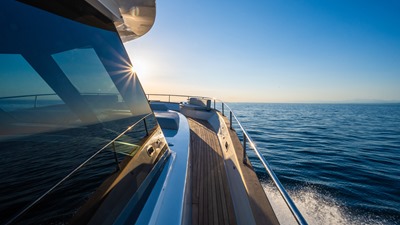
Having proper insurance is important whether you are at sea or docked at a shipyard. MHG is your specialized broker when it comes to crew insurance. Our insurance specialists have the knowledge and experience to find the policy that works best for you. If you are interested in purchasing, or have any questions about yacht crew insurance or travel insurance, please contact us at +1 954 828 1819 or +44 (0) 1624 678668.
Categories:
- Business Insurance
- Expatriate Insurance
- Marine Crew Insurance
- Ocean Marine Insurance
- Property and Casualty Insurance
- Travel Insurance
- Trip Cancellation Insurance
- US Life and Health
What Others Are Reading
- Want to Join a Cruise as a Guest Lecturer? Here's Everything You Need to Know.
- The Resurgence of Travel Agents
- How Much Money Could Trip Cancellation Insurance Save You?
- The Best Places in the World to Network for New Yacht Crew Jobs
- What It's Like to Work on a Cruise Ship?
Talk To A Broker!
Call +1 954 828 1819 or +44 (0) 1624 678668 to speak with a broker about your specific insurance needs or fill out this form and we will get back to you within one business day.
Want a Quote Online? Click Here...
Yacht jobs in seconds, reviews and salary data
Yachtcareerhub connects you to the perfect jobs faster and easier, you're in great company.

United States
by Crew Network
2nd Engineer
Mediterranean
by The Crew Hunter
Lead Deckhand
by Lighthouse Careers
by Crew and Concierge
Deck/ Engineer
by Bluewater
Start: April 8th
Bahamas/Caribbean
by Northrop & Johnson
by Marinescence
States and the Bahamas
Sole Engineer
Chief officer.
1st April 2024
by 19 London
Thousands of yacht crew use YachtCareerHub every day
Powering yacht careers around the world, from greenies, to salty sea dogs
crew registered
crew agencies listed
active jobs
yachts reviewed
Get personalised job alerts directly to your inbox
Subscribe to YachtCareerHub+ to access job alerts and saved jobs
Personalised Job Offers: Set your preferences to only receive jobs that match what you are looking for, and nothing else. No spam, or irrelevant jobs!
Be among the first to apply: Don't be applicant 225, get in the frame early directly with the recruiter to give yourself the best chance. Job alerts are sent as soon as they are posted onto our website to our subscribed members so you can apply directly with the recruiter.
Saved Jobs: If you see a job you like, hit save so you can check your saved jobs list and apply later on. This also helps you track which jobs you applied for.
Yacht Reviews
We have over 200 yachts reviewed on our platform, to give you first hand insights into life onboard as crew
Post Anonymously: You can post your job title or choose to remain anonymous when posting a review.
Admin Approval: We check all reviews to ensure that they meet our community guidelines before publishing live.
Access Reviews: In order to gain access to our full catalogue of yacht reviews, you must first leave a review of your own.
Yacht Crew Salaries
In any industry it is always important to know your worth. This is why we created the go-to platform for yacht salaries and conditions.
See median averages for your positions as well as the full range of salaries.
Find out what types of contract are being offered, as well as rotation lengths.
See which positions usually include business class flights, private cabins and more.

- Member Login
- Connect with Us
- Like us on Facebook
- Follow us on Twitter
- Sign Up For Our Jobs Newsletter
Even though most people that work on yachts do it primarily because they love the lifestyle, it is still a job and the pay and benefits associated with it are important. Working on a yacht is not easy, and depending on the type of yacht and whether it is privately owned, you may be expected to be available at a moment’s notice. All of this can lead to receiving very good pay and benefits. In this article, you’ll learn about the average pay ranges for the most common jobs in the industry, the additional perks and benefits you may receive, and all about the typical contract for yacht crew members.
If you have absolutely no experience working on a yacht or in the hospitality industry, you may want to volunteer to work on a cruise or two. First, this can provide you with experience you can add to your resume, which will help you get a paying a job. Second, it can help you decide if yachting really is a good career for you before you sign a contract and commit to it. However, once you get a paying job, there are many factors that play into how much money you will earn. Here are the main factors that determine how much you’ll be offered:
- The job: the more skills, training, and experience needed to do it, the higher the pay will be. Captains receive the highest salaries, stewards and deckhands can receive the lowest.
- The yacht: is the yacht privately owned? Chartered? Is it large with many crew members or small with just a few? Larger, privately owned yachts tend to pay higher salaries, although there are always exceptions to this "rule."
- You: Is this your first job? Second? Have you had extensive training or years of experience? Do you have glowing recommendations from previous captains or owners? All of these can affect the salary you are offered.
In general, though, there are standard ranges that you can expect for each of the main yacht crew jobs. They are:
- Captain: $65,000 per year to $125,000 per year
- First Officer or First Mate: $48,000 per year to $80,000 per year
- Chief Engineer: $42,000 per year to $80,000 per year
- Assistant Engineer: $36,000 per year to $55,000 per year
- Chef (Head Chef): $42,000 per year to $80,000 per year
- Assistant Chefs or Cooks: $36,000 per year to $75,000 per year
- Steward/Stewardess: $30,000 per year to $45,000 per year
- Purser: $36,000 per year to $60,000 per year
- Deckhand: $36,000 per year to $60,000 per year
The topic of pay is covered in more detail in the Job Descriptions section. Click the link below to get more details about the benefits and perks crew members can receive.
Benefits & Perks for Yacht Crew
You are visiting the Members Section as a Free BASIC Member . You will only have access to a limited amount of Job Hunting Tools and Content. For full access you will need to upgrade to a PREMIUM MEMBERSHIP.

What Size Yacht Requires a Crew? Here’s What You Need to Know

Do you dream of owning your own luxury yacht? Are you wondering what size yacht requires a crew and what kinds of responsibilities the crew members have? Whether you are just beginning to plan your yacht purchase or are a seasoned boat owner, this article will provide you with valuable information about the types of crew members, their responsibilities, and the benefits of having a crew on a yacht.
You will also learn how to choose the right crew for your yacht, considerations for hiring a crew, and how to properly care for your yacht crew .
So, let’s dive in and explore the exciting world of yachting!.
Table of Contents
Short Answer
Yachts that are over 30 feet in length generally require a crew to operate them safely.
This is because larger yachts typically require more maintenance and management than smaller ones, and without a trained crew, they can be difficult and dangerous to operate.
Some yacht owners opt to employ a full-time crew, while others may hire part-time or seasonal help depending on their needs.
What is the Definition of a Yacht?
When it comes to understanding what size yacht requires a crew, its important to first define what a yacht is.
A yacht is a large, luxurious vessel that is typically used for pleasure trips.
Yachts are typically motorized, and can vary greatly in size and design.
They may be used for leisurely cruises, racing, or any other type of recreational activity.
Yachts can range from small, open-deck vessels to large, multi-deck superyachts.
Generally, yachts over 80 feet in length are considered to be large enough to require a crew for operation.
The size of yacht that requires a crew depends on the size of the vessel, its intended purpose, and the needs of the owner.
Large yachts may require a larger crew to operate and manage the vessel, while smaller yachts may only need one or two crewmembers.
The crew will typically consist of a captain, engineer, mate, deckhand, steward or stewardess, and chef.
The captain is responsible for the navigation and operation of the yacht, as well as overseeing the other crewmembers.
The engineer is responsible for the maintenance and repair of the yacht.
The mate is responsible for deckhand duties such as cleaning and painting.
The deckhand is responsible for assisting the mate with various tasks.
The steward or stewardess is responsible for housekeeping and other guest services.
The chef is responsible for preparing meals for the guests.
Overall, the crewmembers are responsible for the day-to-day operation of the yacht, including navigation, maintenance, and housekeeping.
They are also responsible for providing a safe and enjoyable experience for the yacht’s guests.
Depending on the size of the yacht, the crew may also be responsible for additional tasks such as security, entertainment, and other services.
What Size Yacht Requires a Crew?

When it comes to yachts, size definitely matters.
If you want to enjoy the luxury of sailing the open seas, you’ll need to consider if a crew is necessary.
Generally speaking, yachts over 80 feet in length require a crew to operate.
Larger yachts may require a larger crew depending on the needs of the owner.
When it comes to crewmembers, they can include a captain, engineer, mate, deckhand, steward or stewardess, and chef.
These crewmembers are responsible for the day-to-day operation of the yacht, including navigation, maintenance, and housekeeping.
Additionally, they are responsible for providing a safe and enjoyable experience for the yacht’s guests.
The captain is typically the most experienced member of the crew and is in charge of all operations on the yacht.
The engineer is responsible for the maintenance and repair of the yachts mechanical systems.
The mate is responsible for navigation and safety, as well as assisting the captain with tasks.
The deckhand is responsible for taking care of the exterior of the yacht, such as cleaning, painting, and polishing.
The steward or stewardess is responsible for providing hospitality services to the guests, such as serving food and drinks.
Lastly, the chef is responsible for preparing meals for the guests.
Having a crew onboard a yacht is beneficial for many reasons.
A crew ensures that the yacht is operated safely, efficiently, and with the utmost care.
They also provide a level of luxury and convenience that many yacht owners desire, such as gourmet meals, drinks, and recreational activities.
Furthermore, having a crew onboard can help to alleviate stress and anxiety, allowing the yachts owner to focus on enjoying the voyage.
In conclusion, yachts over 80 feet typically require a crew to operate.
Depending on the size and needs of the yacht, the crew can include a captain, engineer, mate, deckhand, steward or stewardess, and chef.
Having a crew onboard provides a level of luxury and convenience that many yacht owners desire.
Furthermore, a crew ensures that the yacht is operated safely and efficiently.
Types of Crew Members and Their Responsibilities
When it comes to operating a yacht over 80 feet in length, a crew is necessary.
The size and number of the crew will depend on the needs of the yachts owner, as well as the size and type of yacht.
Common crew members can include a captain, engineer, mate, deckhand, steward or stewardess, and chef.
Each crew member has a unique set of responsibilities that are essential for the successful operation of the yacht.
The captain is the leader of the crew and is responsible for the overall safety, navigation, and maintenance of the yacht.
They must have the appropriate qualifications and experience to safely navigate the vessel and its passengers.
The captain is also responsible for ensuring that the yacht complies with all applicable laws and regulations.
They are often the main point of contact between the yacht and any authorities.
The engineer is responsible for the maintenance and upkeep of the yacht.
They must be knowledgeable in all aspects of the yachts mechanical and electrical systems, including engines, generators, and other onboard systems.
They are also responsible for troubleshooting and repairing any issues that may arise.
The mate is responsible for assisting the captain with navigation, maintenance, and other duties.
They must have an understanding of the vessels systems and be able to take the helm in the captains absence.
The deckhand is responsible for maintaining the exterior of the yacht.
This includes cleaning, polishing, and waxing the hull, decks, and exterior surfaces.
They must also be knowledgeable in the use of deck equipment, such as winches, windlasses, and mooring lines.
The steward or stewardess is responsible for housekeeping duties on board the yacht.
This includes cleaning and maintaining the interior of the yacht, as well as preparing meals and drinks for the guests.
The chef is responsible for preparing meals for the guests and crew.
They must be knowledgeable in all aspects of food preparation and presentation, as well as food safety and hygiene.
These are the typical crew members of a yacht over 80 feet in length.
Each crew member is responsible for ensuring the safe operation of the yacht and providing a pleasant and enjoyable experience for the guests.
An experienced and knowledgeable crew is essential for the successful operation of any yacht.
Benefits of Having a Crew on a Yacht

Having a crew on a yacht is an invaluable asset for any yacht owner.
A crew can provide a variety of services and benefits that can greatly enhance the experience of owning a yacht.
Having a crew on board can increase the safety of the yacht and its passengers.
A crew can help to navigate the yacht through unfamiliar waters, as well as handle any emergencies that may arise.
A well-trained crew can also help to maintain the yacht, ensuring that it is running at optimal performance.
In addition to safety, a crew can also provide a more enjoyable experience for those on board.
A crew can be responsible for housekeeping and meal preparation, freeing up the owner and guests to relax and enjoy the journey.
A crew can also help to organize activities, such as fishing, waterskiing, and sightseeing, to ensure that all passengers are entertained.
Having a crew on board also allows for greater flexibility when it comes to planning a trip.
A crew can help to plan a route, as well as provide advice on the best places to visit, the best restaurants to dine at, and the best activities to enjoy.
Finally, having a crew on board allows for peace of mind when it comes to operating and maintaining the yacht.
A crew can handle repairs and maintenance, as well as provide timely advice on any issues that may arise.
Overall, having a crew on a yacht can provide a wealth of benefits that can help to make the experience of owning a yacht much more enjoyable.
From increased safety and flexibility to more enjoyable activities, a crew can help to make owning a yacht a truly remarkable experience.
How to Choose the Right Crew for Your Yacht
Choosing the right crew for your yacht is an important decision that can make or break your boating experience.
Not only do you need to consider the size of the yacht and the number of crew members required, but you also need to make sure that the crew members you select are experienced, well-trained, and knowledgeable about the type of yacht you have.
When selecting a crew for your yacht, there are a few key factors to consider.
First, you need to make sure the crew members are qualified and certified to operate the vessel.
It is important to have a captain and crew that have the necessary certifications and experience to safely operate the yacht.
Additionally, you should consider the size of the crew you need.
Depending on the size of your yacht and the activities you plan to do, you may need more or fewer crew members.
In addition to experience and qualifications, you should also consider the personalities of the crew members.
You want a crew that is professional and knowledgeable, but also friendly and accommodating.
You want to make sure that the crew you select will be able to work well with the yachts guests and make sure everyone has a safe and enjoyable experience.
Finally, you should consider the cost of the crew.
Different crew members may have different rates depending on their qualifications and experience.
You should also factor in the cost of any additional supplies or equipment needed to operate the yacht, as well as any licensing or permit fees.
With careful consideration and research, you can select a crew that is qualified, knowledgeable, and friendly, and that will ensure that everyone aboard the yacht has a safe and enjoyable experience.
Considerations for Hiring a Crew

When it comes to hiring a crew for a yacht over 80 feet in length, there are a few key considerations to keep in mind.
The first is the size of the yacht.
Depending on the size and layout of the yacht, the number of crew members required may vary.
Larger yachts typically require a larger crew to manage maintenance, navigation, and housekeeping duties.
The second is the type of crew members you need to hire.
Yachts over 80 feet will typically require a captain, mate, engineer, deckhand, steward or stewardess, and a chef.
These crew members are responsible for the day-to-day operation of the yacht, and must be experienced and knowledgeable in their respective areas.
The third is the budget.
Hiring a crew for a yacht of this size can be expensive.
Depending on the size and scope of the vessel, the cost of hiring a crew can range from tens of thousands of dollars to hundreds of thousands of dollars.
Finally, you should also factor in the experience of the crew.
It is important to hire experienced and knowledgeable crew members who are familiar with navigation, maintenance, and housekeeping.
They should also be able to provide a safe and enjoyable experience for the yacht’s guests.
By taking all of these considerations into account, you can ensure that your yacht is well staffed and that the crew is up to the task of operating and maintaining the vessel.
How to Care for Your Yacht Crew
Having a yacht crew can be a great way to make sure your yacht is running smoothly, but it also comes with certain responsibilities.
As the yacht owner, you must ensure that your crew is taken care of and their needs are met.
This means providing them with proper wages, benefits, and a safe and comfortable working environment.
The first step to taking care of your crew is to ensure they are paid a fair wage.
This should be based on the size of the yacht, the type of work they will be doing, and the amount of experience they have.
It’s important to remember that the crew is responsible for the safety and enjoyment of the yacht and its guests, so they must be adequately compensated for their work.
In addition to wages, the crew should also be provided with benefits such as health insurance and paid vacation.
This ensures they are taken care of and that they can take time off if needed.
It also shows that you value their contributions to the yacht and appreciate their hard work.
Finally, you should also provide a safe and comfortable working environment for your crew.
This means making sure the yacht is well-maintained and that all safety protocols and regulations are followed.
It also means providing adequate rest and leisure time for the crew, as well as ensuring that their living quarters are clean and comfortable.
Taking care of your yacht crew is essential for ensuring that your yacht runs smoothly and that your guests have a safe and enjoyable experience.
By providing them with a fair wage, benefits, and a safe and comfortable working environment, you can make sure your crew is taken care of and your yacht is running at its best.
Final Thoughts
As you can see, owning a yacht larger than 80 feet will require a crew to operate.
Depending on the size of your yacht, you may need to hire a captain, engineer, mate, deckhand, steward or stewardess, and chef.
When choosing your crew, it is important to consider their experience, qualifications, and availability.
Additionally, it is important to be mindful of their wellbeing and provide them with a safe and comfortable environment.
Ultimately, having a crew on your yacht can provide many benefits and provide you with a memorable and enjoyable experience.
James Frami
At the age of 15, he and four other friends from his neighborhood constructed their first boat. He has been sailing for almost 30 years and has a wealth of knowledge that he wants to share with others.
Recent Posts
Does Your Boat License Expire? Here's What You Need to Know
Are you a boat owner looking to stay up-to-date on your license requirements? If so, youve come to the right place! In this article, well cover everything you need to know about boat license...
How to Put Skins on Your Boat in Sea of Thieves? (Complete Guide)
There is a unique sense of pride and accomplishment when you show off a boat you customized to your exact specifications. With Sea of Thieves, you can customize your boat to make it look like your...

Get Onboard
Superyacht Training

Packing Essentials for your first Yacht Job
Packing your suitcase for a job on a luxury yacht is nothing like packing as a guest. You’ll need to pack light due to limited space, which may seem like a near impossible task if you are a first-timer! We have tips to help you to pack only the essentials.
Choosing a good suitcase, bag or travel backpack
Before you even start deciding what to pack, you’ll need to know what you’re going to be packing your belongings in. Stay clear of hard, square-shape suitcases, which are challenging to store on board. Instead, look for a collapsible bag like a backpack, sports bag, or duffel bag that has wheels at one end for ease of transportation from one point to another.
No yachtie could live without flip-flops. You may wear deck shoes while dockwalking, but as soon as you get that job you will live most of your yachting life in flip-flops, or even barefoot.
In addition to your flops, pack a pair of shoes that can be used purely indoors on the boat, like sneakers.
Pack only what you need. Storage space in crew cabins is extremely limited – you risk getting off on the wrong foot with your cabin-mate if you try to force masses of clothes into your tiny, shared hanging space. Once the season starts you’ll be wearing your uniform or PJs most of the time anyway. Weather and season play a big role in what you pack. Make sure that what you have is interchangeable and can be layered: a couple of sets of warm clothes and a jacket such as a puffer that can easily be compacted. Bring along some casual summer clothes – opt for a few tops and bottoms in basic colours that you can easily mix and match. A pair of old shorts and t-shirts is always a good idea in case you are asked to do some grubby work during the day.
Swimwear, a beach towel or sarong, and sunglasses are staples. Get sunglasses with polarised lenses if possible, especially if going for a job on deck. Wear a watch at all times to help you stay punctual, as this is a vital aspect of working on a yacht. Pack a comfy pair of track pants and a hoodie for relaxing and watching movies in the crew house. For female crew, a skin-tone tank top or nude undergarments are a good investment as white uniforms may be a bit transparent. Try to pack your clothes as efficiently as possible by rolling each item rather than folding. This not only prevents wrinkles, but creates more space for bulkier items like toiletries and gadgets.
When you get a job on a yacht, you likely won’t have to worry about buying standard toiletries. Many yachts provide the basics like shower gel, toothpaste, toothbrushes, deodorant, shampoo and conditioner, shaving cream, razors and blades (some yachts), sunscreen, and moisturiser. Small travel-size versions of specific brands that you like are useful to make up for the products your vessel doesn’t provide and will tide you over whilst on land. Avoid bringing a truckload of cosmetics and other products to clutter up your cabin bathroom. If you are wearing make-up, consider onlpacking those that don’t take up a lot of space, like a multi-purpose base/BB Cream or moisturiser and mascara.
Supplements
You will be working long hours and it’s important to stay on top of your health. Energy drinks and coffee may work for a little while, but are not a long-term solution. Bring vitamins and other necessary supplements to help you stay in top shape! Of course, if you require any special medication, be sure to check that you have packed those too.
Tech, Gadgets & Books
There are a few tech essentials you may want to pack, as well as things to keep you busy in your off time:
- A USB stick (and a spare) for your CV and other documents. Laminate original documents such as certificates and email yourself scanned copies of these, your passport, driving licence, and credit cards. Get an international driving licence if possible, but this is not critical as you’ll be spending most of your time on the boat.
- A global adaptor plug and an unlocked smartphone you can put a local sim card into.
- A Kindle or other device for reading when you want to hide out in your cabin and get some ‘me’ time.
- If you have a light, small laptop or iPad, feel free to bring it, but make sure that you have travel insurance (health and theft).
- If you enjoy taking photos, a smartphone will have to do. It takes up much less space than a big camera!
- Noise cancelling headphones for watching movies, and/or ear plugs to help you sleep (close quarters) are a good investment.
Tip: Download books or movies before you leave land – you’ll be unpleasantly surprised at how slow the internet on many superyachts is and captains will often restrict your wifi access to preserve bandwidth for the guests.
Personal Items – Sentimental Stuff
Think about small items that will help you relax, feel at home and less homesick when stress runs high. Some ideas include photos of family or friends (remember that the internet might be really slow, or sometimes restricted for crew to use – so you likely won’t have access to Facebook or Instagram), a journal, essential oils, and a sleeping mask.
Nice to Have Items Where Space Allows
For the days where you do get a break, it’s really nice to have your own set of beach basics and equipment such as a snorkel, mask, fins and possibly a wetsuit. Only pack these if you really have the space. You may be able to borrow from another crew member or from the yacht.
A good mantra to help you decide if you should pack something or not, is “when in doubt, leave it out”. We hope that you have fun gearing up for your journey. If you have any questions or queries, or would like suggestions regarding travel bags, get in touch with us , or download our ultimate guide to working on a yacht (which includes all of our personal tips!).
Needing more?
Error: Contact form not found.
RYA/MCA Online
1. what are the basic requirements you need to be eligible to work in the yachting industry, 2. what is the stcw and why do i need it, 3. what is the eng1 medical certificate, 4. what land based experience will help me find a super yacht job, 5. what are the different departments onboard, 6. what crew training is required for me to work as a junior deckhand.
- Yachtmaster/Coastal Skipper Theory
- Yachtmaster/Coastal Practical
- Specialist Super Yacht Training Course (Deck Hand Training Course)
- RYA Power Boat Level II
- RYA Personal Watercraft Course
- RYA Competent Crew Certificate
- RYA Day Skipper Theory and Practical Certificates
- VHF Radio Operator’s License
7. What crew training is required for me to work as a junior stewardess?
- Stewardess Course
- Proficiency in Designated Security Duties (PDSD)
- MCA Food Safety Level 2
- RYA Powerboat Level 2
8. How do I book my training courses?
9. how do i get my first job on a yacht, 10. are these courses worth it, or am i just wasting my money, 11. will i get hired for my first job from south africa, 12. what is daywork, 13. what are the best locations to get a yacht job, 14. how much can a motor yacht stewardess or deckhand earn, 15. what are the negatives of working on a yacht, 16. what are the positives of working on a yacht, 17. is working on a super yacht for everyone, 18. what is the minimum age to work on a yacht, 19. is accommodation provided when i am completing my yacht training in cape town.

Reference Checking
In simple terms, we take on the challenge of verifying a superyacht candidate’s references, whether they have registered with us before or are new to our database of yacht crew.
We contact each and every yacht crew reference with our multilateral approach, using our Gold Standard system that sets us apart from other companies in the superyacht industry. When we receive a yachting CV, we conduct thorough background checks of professional crew via in-depth email and telephone conversations.
We appraise and vet each yacht candidate in the following areas:
- Job-Specific Skills and Yacht Knowledge
- Leadership and Management
- Personal Attributes
- General Abilities
- Shipboard Systems and Procedures
- Benefits for the employer
- Benefits for the Candidate
For many employers , crew references can be a burden. The process of hiring a new yacht crew member has many challenges, including time constraints imposed by a yacht’s program, the restricted availability or outdated contact details of crew references, and lack of information on a yachting CV. When you outsource superyacht crew references, yacht crew documentation, and crew security checks to us, we relieve your already excessive workload.
By hiring us to check a candidate’s references, you can be assured that each yacht crew member has been thoroughly vetted by our Gold Standard procedures. You will be provided with a recruitment report that outlines the yacht crew candidate’s strengths, weaknesses, attributes, and abilities. With this superyacht reference information, you can determine who is the best candidate that fits your program and existing yacht crew.
Benefits to the employer
- A trusted source for in-depth verified yacht references.
- Time-saving throughout the crew recruitment process .
- Impartial report of potential weaknesses in yacht crew skills.
- Support and guidance on how to build on the candidate’s strengths and develop their weaknesses.

For the yacht crew candidate, finding a professional yacht job and navigating the superyacht hiring process can be stressful. It’s important to be in contact with many Crew Agencies and yacht recruitment platforms to promote your yachting CV and make sure all of your referees’ details are current and up to date.
This process will be much smoother if you have checked your superyacht references ahead of time. Create an account with us and have all of your previous references on file in a central hub for superyacht crew documents. This information will be available at the push of a button for your next yacht employer and eliminates any delay for them – setting you apart from any other individuals applying for the job.
Benefits to yacht crew candidates
- One trusted central hub for your crew references, available to agents and employers alike.
- References are checked ahead of time and stored on our secure server. When it is time to apply for a new role, no last-minute verifications are needed.
- Free impartial advice and superyacht crew mentoring.
- We provide support and guidance in the event of any uncomfortable experiences or negative feedback arising from past employment.

We understand that no one is perfect, and not every crew member will match every program and/or yacht team. In some circumstances, crew depart a yacht with negative feedback or references.
Through in-depth conversations with a referee, we work closely alongside our candidates to learn from all superyacht references, ultimately putting them in a better position for future roles.
We support superyacht crew to find the right job fit. We offer a complete picture to future employers who will value a candidate’s strengths and attributes, and work with them in any areas of weakness.
Unrivaled support services tailored for Yacht Recruitment

IMAGES
COMMENTS
The tips depend on the size of the Yacht and the guests, but a good estimate is 10 - 20% of the total weekly price of a Yacht. If you imagine a 50m (165 foot) Yacht with 9 crew, it typically charters for $150,000 - $250,000 per week. For simplicity, let's add a 15% tip for $200,000/wk.
Six benefits of working as superyacht crew. 1. The yachtie lifestyle. Working as yacht crew allows you access to a completely different lifestyle. While you will be working, you'll also be living aboard one of the most expensive vessels in the world, and all whilst in the company of some of the world's most influential people.
Working on a yacht is a unique experience, and it can be incredibly rewarding for those who are ready for the challenges and opportunities that come with the job. In this article, we'll explore what it takes to be a yacht crew member and discuss the benefits, qualifications, challenges, and risks that come with the job.
The Results of the 2022 Salary Survey. Our annual salary survey provided some unprecedented insights to what captains and crew earned in 2022. As restrictions eased and the world opened up more, owners and guests have wanted to spend more time on board, and boats are, once again, willing to fly crew in. With some crew swallowing the anchor and ...
Yacht crew is a service job at its core, and every yacht owner is looking for service-oriented people who understand how to deliver a hotel-quality living and restaurant-quality fine dining. ... Because so many jobs are seasonal and may occur in different countries and locations, benefits offered to yacht crew vary widely. But it is not ...
Specifically, the salaries were 7,000 to 8,000 euros ($7,600 to $8,700) vs. 3,500 to 4,000 euros ($3,800 to $4,400). Since on-deck positions range from captains to entry-level deckhands, yacht crew salaries here span a wide range. Notably, captains for 328-foot-plus (100-meter-plus) megayachts can get bonuses on top of an average 18,000 euros ...
There are around 37,000 yacht crew members employed on the 6,000+ superyachts around the world. And that doesn't even count the smaller yachts and sailboats out there too. ... Yacht Job Benefits. You don't have to pay rent when you work & live on boats, and your food is included too, so you can really save a lot of money. But many yachties ...
Some crew members get lucky working for generous yacht owners, while others get treated like the help. "It's hard work and long days when they are on board," said Martin, the captain of a 155-foot ...
Deckhand. $3,000 - $5,000. Steward/ess. $3,500 - $6,500. Chef. $4,500 - $10,000. Aside from these positions, experience, qualifications and yacht size can affect salaries. Gratuities can boost earnings too. It's important to be aware of trends when it comes to salary structure.
Similarly, Louise Cailbourdin, crewing manager at the Crew Network, Fraser's crewing arm, lists pride in appearance and good personal hygiene, adding "the light in their eyes that shows enthusiasm". When he's hiring, Tripp Hock, captain of 45 metre Heesen motor yacht Amore Mio, looks for a certain grit in that enthusiasm.
"This requires awareness and effort on the part of the captain and crew, but the benefits are clear; standards increase as do loyalty to the yacht and the team. When a crew member leaves and another joins, the process begins again and you quickly regain your high performing team. A happy crew is a stable crew." This echoes our own ...
Other benefits include room and board, basic living essentials, crew uniform, access to email, performance-based bonuses, and possibly life insurance. The captain may also get the use of a car to use in ports or at the home port. Other perks can include the use of the yacht itself, the ability to invite friends onboard, and the use of the yacht ...
Here's the truth about yacht crew life. It can be all the fun, sunshine, exploration and travel - but that is not the job. Yachting is an industry of extreme highs and extreme lows. ... For many, the benefits of a yacht job outweigh the negatives. These include travelling the world, the opportunity to make and save a lot of money, making ...
Entry level Deckhands and Steward/ess should be expecting around €2,500 Euros per month. Day work is usually paid around €100-€120 Euros per day with lunch included. Tips: Do not offer to work for free Ensure you cover your own taxes (this will not be done for you) For more advice please visit our webpage- Green Crew or contact one our team.
Crew Benefits. In addition to the usual salary and benefits, a yacht's owner is expected to pay for all crew living expenses when the crew lives and works aboard, including food, uniforms, and toiletries. Additional benefits could include excellent leave options, health insurance, paid training, the 13th months of pay to reward longevity, or ...
As recruiters, we see first hand the benefits to the owners brought by rotation; crew stability, reduced crew turnover, a sense of appeasement within the team and, of course, the possibility to attract high-calibre crew which leads to a satisfied owner and an enhanced guest experience as well as promoting a sense of enjoyment of their yacht.
MHG is your specialized broker when it comes to crew insurance. Our insurance specialists have the knowledge and experience to find the policy that works best for you. If you are interested in purchasing, or have any questions about yacht crew insurance or travel insurance, please contact us at +1 954 828 1819 or +44 (0) 1624 678668 or visit us ...
Which is why you should have a basic understanding of yacht crew insurance benefits, because even when you leave it for the experts, you need to know what you are getting yourself into. The different benefit options to be aware of are: · Medical/Health Insurance. · Life Insurance. · Accidental Death and Dismemberment. · Personal Accident.
Discover YachtCareerHub+. We have over 200 yachts reviewed on our platform, to give you first hand insights into life onboard as crew. Post Anonymously: You can post your job title or choose to remain anonymous when posting a review. Admin Approval: We check all reviews to ensure that they meet our community guidelines before publishing live.
In general, though, there are standard ranges that you can expect for each of the main yacht crew jobs. They are: Captain: $65,000 per year to $125,000 per year. First Officer or First Mate: $48,000 per year to $80,000 per year. Chief Engineer: $42,000 per year to $80,000 per year. Assistant Engineer: $36,000 per year to $55,000 per year.
A crew can provide a variety of services and benefits that can greatly enhance the experience of owning a yacht. Having a crew on board can increase the safety of the yacht and its passengers. A crew can help to navigate the yacht through unfamiliar waters, as well as handle any emergencies that may arise.
Swimwear, a beach towel or sarong, and sunglasses are staples. Get sunglasses with polarised lenses if possible, especially if going for a job on deck. Wear a watch at all times to help you stay punctual, as this is a vital aspect of working on a yacht. Pack a comfy pair of track pants and a hoodie for relaxing and watching movies in the crew ...
A trusted source for in-depth verified yacht references. Time-saving throughout the crew recruitment process. Impartial report of potential weaknesses in yacht crew skills. Support and guidance on how to build on the candidate's strengths and develop their weaknesses. Contact one of our representatives to discuss the benefits further.